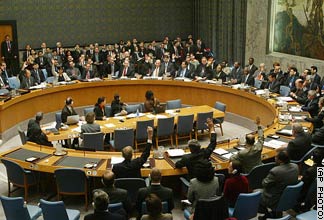UN members oppose tough US proposal on Darfur
By Evelyn Leopold
UNITED NATIONS, Sep 9 (Reuters) – China, Pakistan and Algeria expressed opposition on Thursday to a tough U.S. draft resolution that would threaten Sudan with an oil embargo but supports a large African Union presence in the country’s volatile Darfur region.
 Speaking to reporters before the 15-member U.N. Security Council began discussing the draft, China’s U.N. ambassador, Wang Guangya, raised the specter of a veto if the resolution were not modified.
Speaking to reporters before the 15-member U.N. Security Council began discussing the draft, China’s U.N. ambassador, Wang Guangya, raised the specter of a veto if the resolution were not modified.
“Personally I would say if the draft stands as it is now, it would certainly be more than (an) abstention,” Wang said.
The main backing for the draft resolution comes from European nations on the council, including Britain, France, Germany, Spain and Romania as well as Chile. A minimum of nine votes and no veto is needed for passage.
Both the Pakistani and Algerian ambassadors said they would probably abstain unless the resolution were changed, objecting to sanctions threats in particular. They said several other council members agreed.
Asked about Secretary of State Colin Powell’s statement in Washington on Thursday that genocide had taken place in Darfur, Algerian Ambassador Abdallah Baali said the African Union at its recent summit “said very clearly that there is no situation of genocide or ethnic cleansing.”
He and Pakistani Ambassador Munir Akram indicated they would oppose a section of the resolution which asks U.N. Secretary-General Kofi Annan to set up a commission to determine if genocide had taken place.
“We have always advocated doing things that are necessary to do without the need for threats,” Pakistani Ambassador Munir Akram said.
He said his country did not buy oil from Sudan and did not have strategic interests there. “It is only a question of seeing what is the practical thing to do to help the people who are suffering.”
“We abstained on the last resolution and this one goes even further. At the moment I don’t see the need for the resolution,” Akram added.
The resolution backs a larger African Union force and an expanded mandate so it could investigate abuses against civilians, caused mainly by African militia, known as Janjaweed. More than 1 million African villagers have been uprooted from their homes.
Nigerian President Olusegun Obasanjo, who has been conducting peace talks on Sudan for the African Union, said the 53-nation alliance would “enhance and augment” its monitoring mission in Darfur.
In a letter to the council, circulated on Thursday, Obasanjo said he agreed with a wider mandate, such as proactive monitoring, investigation of violations and visits to camps for uprooted African villagers.
All three ambassadors said that the resolution was tougher than a report last week from Jan Pronk, Annan’s envoy in Sudan. Britain intends to add some positive statements about Khartoum to coincide with Pronk’s report, diplomats said.
Pronk said on Monday during a visit to Oslo that sanctions were a last resort and it was “not time yet to use the last instrument.” The resolution threatens to consider sanctions on oil exports as well as against individual Sudanese officials if atrocities continue. But it does not impose them or give a deadline.
(Larry Fine contributed to this report)
